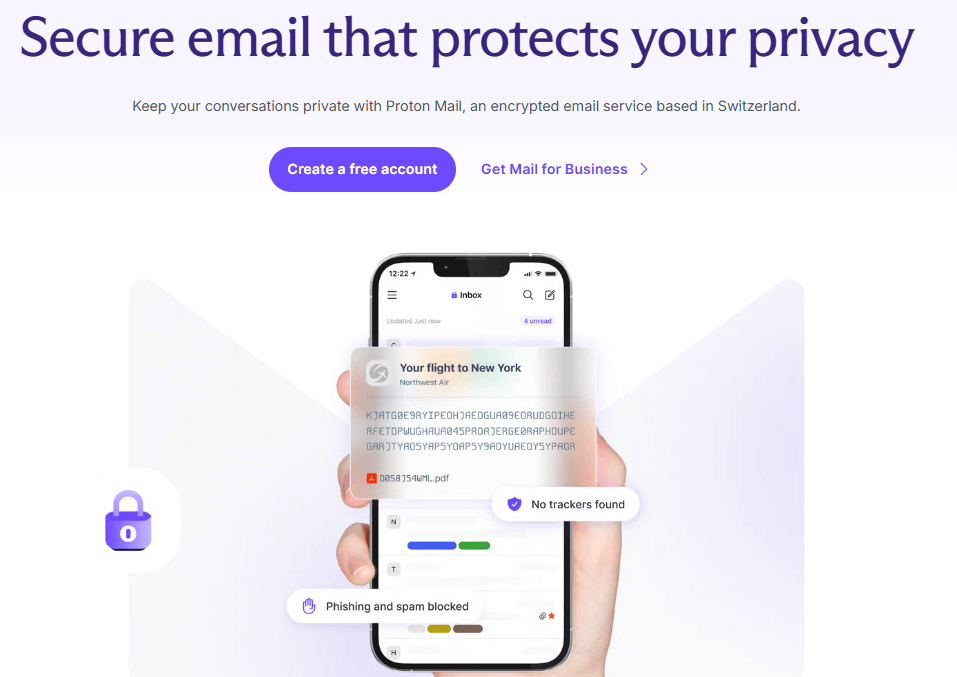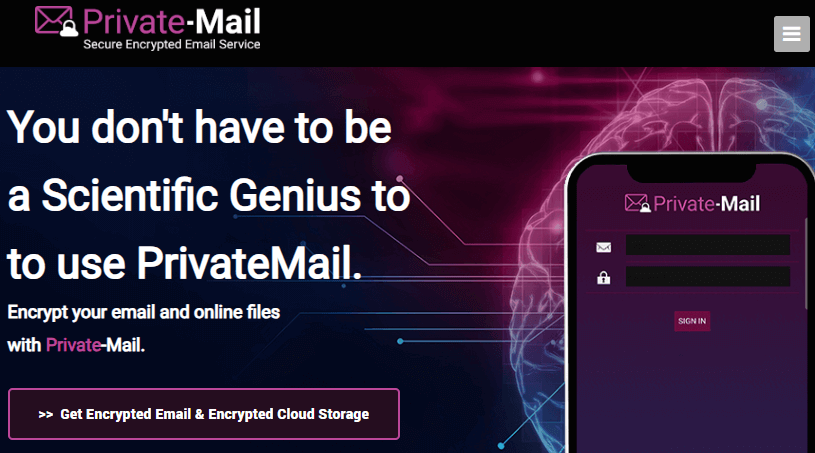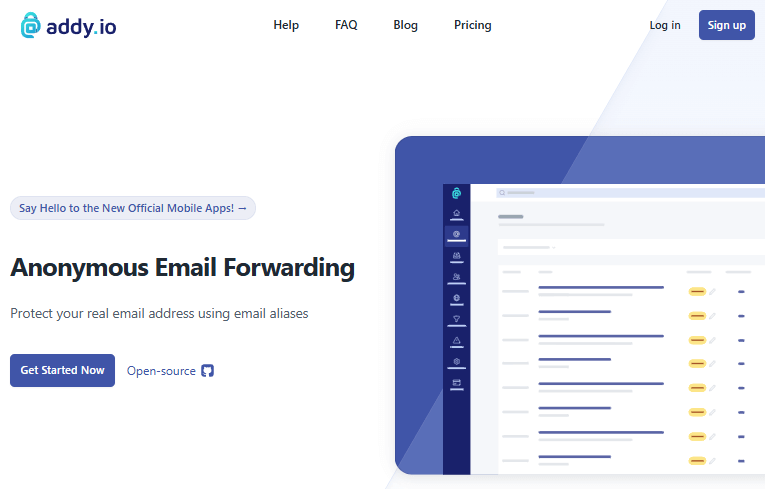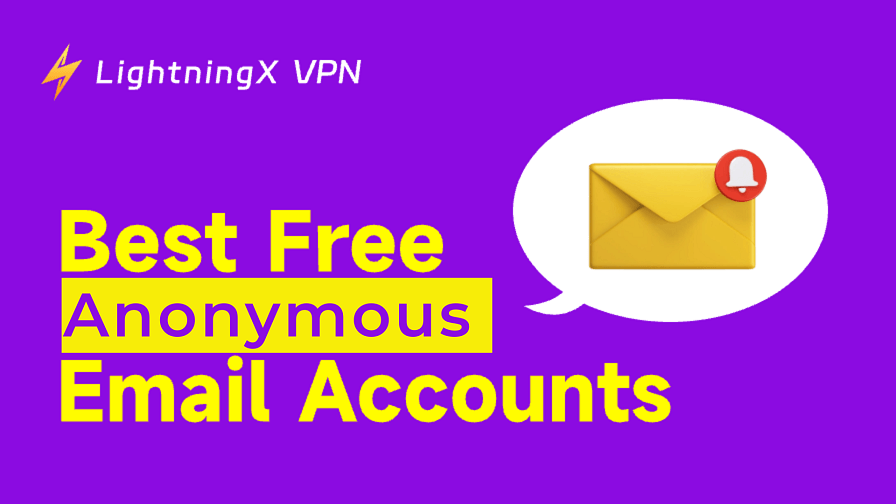Your email address holds more personal information than you might think. It can link you to your identity, track your online habits, and even reveal your location. If you want to send emails without revealing your identity, using a free anonymous email account is the easiest way.
In this guide, we’ll recommend the 8 best free anonymous email services to help you hide your identity and protect your personal information.
8 Best Free Anonymous Email Accounts
1. ProtonMail

- Free Plan: 1 email address, 150 messages/day, 500MB–1GB storage
- Paid Plans: $4.99/month
ProtonMail is a privacy-focused email provider that allows users to communicate securely without linking their identity.
As a trusted encrypted email service, ProtonMail uses open-source PGP encryption to protect messages on your device and during transmission. It also applies a zero-access approach, which means that not even ProtonMail staff can read your inbox.
Creating a ProtonMail account doesn’t require personal information by default. While the service may occasionally ask for phone verification to prevent abuse, many users can register with no phone number.
For free users, ProtonMail offers one free anonymous email address, a sending limit of 150 messages per day, and storage between 500MB and 1GB. It works well for basic daily use, though larger storage or higher activity will require an upgrade.
2. PrivateMail

- Free Plan: 100MB of encrypted email storage and 100MB of secure file storage.
- Paid Plans: Standard Plan:$8.95/month; PrivateMail Pro: $15.95; Business Pro plan: $64.95
PrivateMail is a private email account that supports anonymous email communication, although it’s more focused on privacy for regular use than complete anonymity.
The service uses OpenPGP end-to-end encryption to protect email content during transit and at rest. Files stored in the integrated cloud drive are also encrypted, providing users with a secure way to keep sensitive documents safe. However, it doesn’t apply zero-knowledge encryption on the server side, meaning some system-level access to encrypted data could still exist.
Registering with it requires a recovery email address. However, no other personal information is required, and the platform doesn’t track users or advertise.
PrivateMail offers a free plan with 100MB of email storage and 100MB of secure file storage. Paid plans include increased storage, an encrypted calendar, and full IMAP/SMTP access.
3. AnonAddy

- Free Plan: Up to 10 aliases; 10MB bandwidth per month
- Paid Plans: Lite plan: $1/month; Pro plan: $3/month
AnonAddy is an open-source anonymous email forwarding service that helps you send and receive emails without exposing your real address.
As a private email account solution, AnonAddy uses GPG/OpenPGP encryption and allows encrypted forwarding of messages, including subject lines.
You can sign up without a phone number, but a recovery email is required. The free plan offers up to 10 aliases on shared domains with a monthly bandwidth limit of 10MB.
Paid plans start from $1/month, unlocking features like custom domains, multiple usernames, and increased bandwidth.
4. Guerrilla Mail
- Free Plan: Unlimited disposable addresses
- Paid Plans: No paid plans
Guerrilla Mail is a free anonymous email service built for temporary, no-strings-attached communication. It’s mainly used when you need a disposable address for things like signing up for websites or confirming accounts, without revealing your real email or identity.
Unlike traditional providers, Guerrilla Mail doesn’t ask for any personal details. There’s no signup process, no phone number, and no password. As soon as you open the site, you’re given a working inbox that can receive emails instantly. For extra privacy, you can generate a scrambled version of the address to make it harder to guess. While it doesn’t offer full encryption, the platform is designed to minimize exposure by deleting all messages after 60 minutes.
Because of its limited lifespan and lack of persistent storage, Guerrilla Mail is not suited for regular private email communication. The good news is that this service is entirely free and doesn’t offer any paid plans.
5. Tuta Mail
- Free Plan: 1GB storage and 1 calendar
- Paid Plans: $3.25/month with 20GB storage; €9.60 /month with 500GB storage
Tuta Mail is a private email account provider based in Germany. Unlike some services that only encrypt message content, Tuta encrypts subject lines, inbox contents, contacts, and calendars. It doesn’t rely on PGP, instead using its open-source encryption system. All data is end-to-end encrypted and decrypted only on your device.
Tuta requires no personal information to sign up and does not log IP addresses in sent emails, which helps protect your location. It also allows encrypted communication with non-users using a shared password.
The free plan includes 1GB of storage and basic features like an encrypted calendar and anonymous signup. Paid plans offer expanded storage, support for custom domains, and the ability to create additional aliases.
6. Mailfence
- Free Plan: 1GB storage; 500 MB emails
- Paid Plans: $2.5/month with 10 Alias; $3.5/month with 50 Alias
Mailfence is a free anonymous email account based in Belgium. It uses OpenPGP to offer end-to-end encryption and digital signatures.
Mailfence handles encryption in the browser, meaning the provider has access to some unencrypted metadata, but the message content remains protected. You can use a temporary email address to create an account.
The free plan includes 500MB of email storage and another 500MB for documents, along with access to calendars and contact features. Paid plans start at just $2.5 per month and support up to 10 aliases and encrypted document storage.
Mailfence is perfect for users who want a secure, private email with productivity features.
7. Atomic Mail
- Support Free Trial
- Paid Plans: $89.90 one-time
Atomic Mail is an anonymous email service that uses TLS 1.3 by default and provides end-to-end encryption between Atomic users.
You can send password-protected emails and set them to self-destruct after reading. Emails are stored with zero-access encryption, meaning even Atomic Mail cannot read their contents. You don’t need to provide a phone number or existing email address to create an anonymous account.
Atomic Mail offers a free trial with features like Hide My Email Aliases, encrypted delivery, and no ID verification required. The paid plan is a one-time payment of $89.90 for permanent use.
If you only use an anonymous email occasionally, this service isn’t suitable for you. However, it’s a great value for long-term use.
8. Send Anonymous Email
- Free Plan: Support anonymous emails without attachments
- Paid Plans: $59/year
Send Anonymous Email is a free tool for sending anonymous emails without registration. You simply fill out a basic form with the recipient’s address, subject line, and email content.
The free version of this service doesn’t support attachments, and emails are sent unencrypted. Premium plans unlock features like email attachments, customizable sender names, reply options, and real-time email open tracking.
In summary, Send Anonymous Email is suitable for quick, low-risk communications that don’t require complete privacy or encryption. However, it’s not ideal if you need a more secure, encrypted email service.
Free Anonymous Email Accounts Comparison Table
| Service | Free Plan | Paid Plan |
|---|---|---|
| ProtonMail | 1 address, 150 messages/day, 500MB–1GB storage | $4.99/month |
| Guerrilla Mail | Unlimited disposable addresses | No paid plan |
| PrivateMail | 100MB encrypted email + 100MB file storage | From $8.95/month |
| AnonAddy | Up to 10 aliases, 10MB bandwidth/month | From $1/month |
| Tuta Mail | 1GB storage, 1 calendar | From $3.25/month |
| Mailfence | 500MB email + 500MB file storage | From $2.5/month |
| Atomic Mail | Free trial with basic features | $89.90 one-time payment |
| Send Anonymous Email | Anonymous sending (no attachments) | $59/year |
What Is an Anonymous Email?
An anonymous email means sending emails without revealing your identity. It hides your name, email address, IP address, and any other personal information, making it difficult to trace the email’s origin.
Unlike regular email services that collect personal data, anonymous email providers prioritize privacy. Some providers also use encryption to ensure the security of your emails while they’re in transit online. Therefore, an anonymous email is useful when you want to protect your identity or keep your communications private.
Why You Should Use Anonymous Email?
Here are some reasons why you should use an anonymous email:
- Protect Your Online Privacy: An anonymous email hides your identity. You don’t need to provide your name, phone number, or personal email address. This helps protect you from data tracking and unwanted surveillance.
- Avoid Spam and Junk Mail: Use an anonymous email address when signing up for newsletters, websites, or free trials. This keeps your primary inbox clean and reduces the risk of spam.
- Stay Safe in Sensitive Situations: If you’re a journalist or whistleblower, an anonymous email provides a secure way to communicate.
- Bypass Censorship and Surveillance: In countries with strict internet controls, an anonymous email allows for free communication. It prevents tracking by the government or ISP and protects your right to free speech.
To ensure your anonymous email is truly private, use LightningX VPN with it.
It encrypts your connection, hides your IP address, and doesn’t log any user data. With servers in over 70 countries and no speed or bandwidth restrictions, you can communicate and browse freely on all major devices.
FAQ about Free Anonymous Email Accounts
Q1. How do I send a 100% anonymous email?
To send truly anonymous emails, use a secure anonymous email provider like ProtonMail, Tuta Mail, or Guerrilla Mail, which allow you to create an account without a phone number or name. Remember to access these services through a VPN to avoid using your real IP address, and never include personal information in your emails.
Q2. Is Gmail anonymous?
No, Gmail is not anonymous. Creating a Gmail account requires your phone number and other personal information. Google also collects and analyzes user data for advertising and security purposes.
Q3. Is it safe and legal to use an anonymous email account?
Yes, it is generally safe and legal to use anonymous email accounts, especially when used to protect privacy, avoid spam, or communicate securely. However, using an anonymous email for illegal activities is prohibited in any country.















